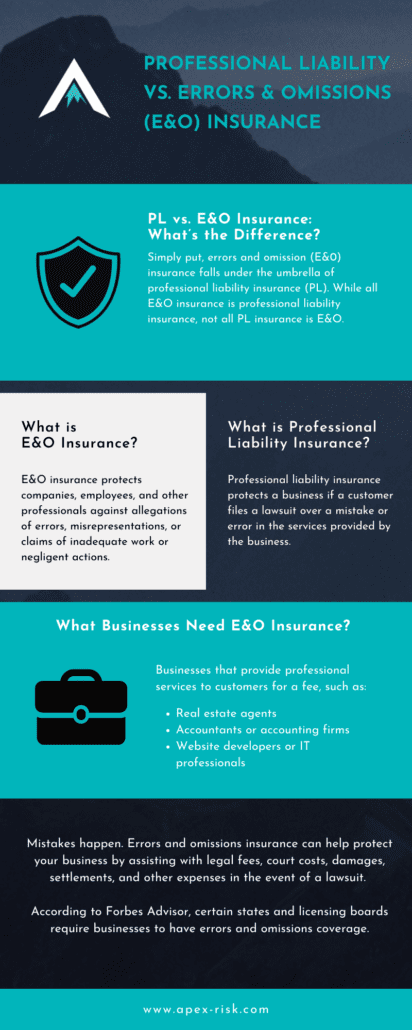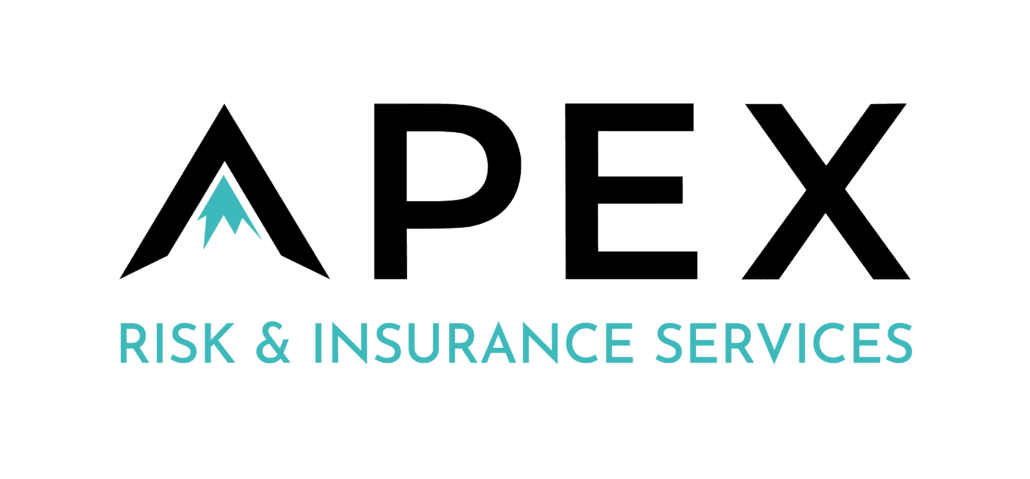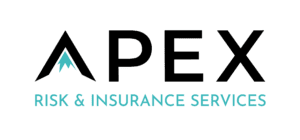Professional Liability vs. Errors & Omissions Insurance
While professional liability insurance (PL) and errors and omissions (E&O) insurance are often grouped together or used interchangeably, the two types of insurance have a few technical differences.
Let’s discuss what they are.
Professional Liability vs. E&O Insurance: What’s the Difference?
Simply put, errors and omission insurance falls under the umbrella of professional liability insurance. While all E&O insurance is professional liability insurance, not all PL insurance is E&O insurance. For example, PL insurance can be malpractice insurance, used by medical professionals.
Many professionals have some form of professional liability insurance, often determined by the industry they are in. For instance, basic professional liability insurance is most commonly associated with professional architects, engineers, and consultants. E&O insurance, on the other hand, is frequently associated with professionals in the real estate, accounting, and tech industries.
What is Professional Liability Insurance?
Professional liability insurance protects a business if a customer files a lawsuit over a mistake or error in the services provided by the business. Professional liability insurance includes several different types of insurance, such as medical malpractice insurance and E&O.
What is E&O Insurance?
Errors and omissions insurance (E&O) is a type of professional liability insurance that protects companies, employees, and other professionals against allegations of errors, misrepresentations, or “claims of inadequate work or negligent actions.”
In simpler terms, according to Chron, E&O insurance helps protect business owners from lawsuits accusing them of things they did (errors) or didn’t do (omissions) while providing service.

What Does E&O Insurance Cover?
While plans can vary, E&O insurance may help to protect your business against the following claims:
- Errors, mistakes, or oversights in the provided service
- Inaccurate professional advice
- Breach of contract
- Omissions
- Misrepresentation
- Violation of good faith
- Missed deadlines
- Failure to deliver a service
- Professional negligence
- Failure to meet a standard of care
If an individual claims that a business made a mistake and sues, E&O insurance may help cover:
- Legal fees (i.e. attorney fees)
- Court costs (i.e. paying for witnesses or reserving a courtroom)
- Damages and expenses
- Judgments or settlements
What Doesn’t E&O Insurance Cover?
E&O insurance may not cover:
- Purposeful wrongdoing or negligence
- Illegal activity
- Data breaches resulting from a cyberattack
- Bodily injured caused by a business
- Property damage caused by a business
- Employee injuries
- Employee harassment claims
- Employee discrimination claims
Additionally, the business owner must have a policy at the time of the claim to be protected. If the coverage lapses, the insurer will not cover the claim.
What Businesses Need E&O Insurance?
Businesses that provide professional services to customers for a fee require a form of E&O insurance. These businesses may include:
- Real estate agents
- Accountants or accounting firms
- Marketing agencies or firms
- Insurance agents or companies
- Website developers, software developers, or IT professionals
- Businesses in the beauty and/or salon industry (i.e. hairstylists and barbers)
- Wedding planners
According to Forbes Advisor, certain states and licensing boards require businesses to have errors and omissions coverage. For instance, some states require real estate agents to show proof of E&O coverage before receiving their real estate licenses.
Why Do You Need E&O Insurance?
Mistakes happen. Errors and omissions insurance can help to protect your business by assisting with legal fees, settlements, and other expenses in the event of a lawsuit.
How Much Does E&O Insurance Cost?
The cost of errors and omissions insurance varies depending on the unique needs of the businesses as well as industry risk, coverage limits, and claims history.
Industry or Business Risk
If your business is in a high-risk industry, you’re more likely to pay a higher premium. For example, large financial consulting firms that offer advice on millions of dollars or accounting firms trusted to correctly file taxes on those millions may be considered ‘high-risk’ industries, therefore paying a higher rate.
Your insurer may review how many lawsuits are in your particular industry to determine the risk of your business.
Coverage Limits
Another factor in determining how much errors and omission insurance will cost is the amount of coverage a business will need.
Claims History
An insurer may also consider any past claims your business has filed.
Interested in learning more? Check out our full guide to Errors & Omissions Insurance, here.
Still Not Sure What Insurance is Right for Your Business?
At Apex, we provide custom solutions to meet your insurance needs. Reach out to us today. Read on to learn more about who we work with at Apex.










